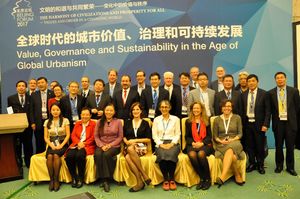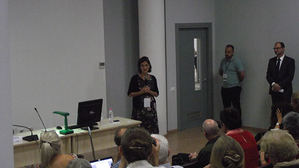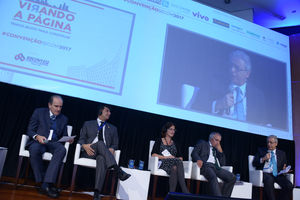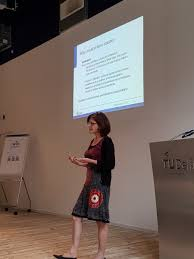News
- March 2019: RE-InVEST final conference
Marja Elsinga and Marietta Haffner attended the final conference of this Horizon 2020 project that took place on 28-29 March 2019. The RE-InVEST team presented its results on Rebuilding an Inclusive, Value-based Europe of Solidarity and Trust through Social Investments. RE-InVEST aimed to develop an alternative way of welfare thinking in the European Union by enhancing the understanding of the concepts of human rights, capabilities and social investments in five service sectors, including housing.
The project highlighted a new social investment strategy aiming for increased inclusive service delivery to vulnerable groups in the EU. The project adopted a novel participative action approach that gives voice to vulnerable groups and civil society organisations in case studies in 13 jurisdictions and realized the co-construction and merging of knowledge between the actors involved. Treating housing as a basic capability and develop housing policies and regulation facilitating not only the receiver of welfare, but also the doer and judge, will strengthen the capability set of housing consumers.
Check out the conference documents and presentations: https://drive.google.com/drive/folders/1-dHcw9WtPiROPg6H-ZyK1WDdtGOGkwkw
Website: http://www.re-invest.eu/events/54-final-conference-programme
- January 2019: Looking for a PhD topic?
PhD-candidates bringing their own scholarship/funding are welcome to check our supervisory capacity on the following research topics: Housing and welfare systems (e-mail to dr. Joris Hoekstra)
Check out the latest announcements: https://www.tudelft.nl/bk/onderzoek/graduate-school-a-be/finding-a-position/hot-topics/
January 2019: Marietta Haffner Managing Editor of Housing Studies, 1 April
The Housing Studies journal editorial team is changing. From 1 April 2019, John Flint and David Robinson will hand over to Ed Ferrari (Sheffield Hallam University, England, UK), Marietta Haffner (Delft University of Technology, Netherlands) and Hal Pawson (University of New South Wales, Australia).- November 2018: Partnership for Affordable Housing conference
Prof. Sasha Tsenkova organized a 3-day conference at the University of Calgary. Marietta Haffner contributed with a paper about the pathways of German and Dutch social housing in the theme of Policy Design to Develop Partnerships for Affordable Rental Housing: https://www.ucalgary.ca/cities/affordable-housing.
- October 2018: Visit with Swinburne University, Melbourne
The Centre for Urban Transitions of Swinburne University of Technology kindly hosted Marietta Haffner for part of her work sabbatical leave. Marietta gave a seminar entitled Private sector affordable housing models in the European Union. Prof Kathleen Hulse acted as discussant from an Australian perspective. A debate around the role of private rental, affordable housing models and housing policy rounded off the session. The visit allowed to explore opportunities to cooperate. Marietta was also invited by the School of Economics, Finance and Property, Curtin University for a seminar about recent trends in private renting in a number of countries in the European Union.
- June 2018: Affordable low energy housing solutions with H4.0E
The Housing 4.0 Energy consortium will build pilot projects of affordable low energy dwellings. Researchers of CHEC will be working on the research part of the project, exploring possibilities for upscaling of the pilots. This includes the development of an open source platform, in which regional stakeholders work together to make low energy housing solutions a reality. Read more. - A number of Marietta Haffner’s book chapters have seen the daylight in the first months of 2018
The chapter entitled Dutch Pensions and Housing: Towards a Social Divide is one of the outputs of the project Integrating residential property with private pensions in the EU that the CHEC team participated in. The book contains country chapters for the UK, Ireland, Germany, Hungary, and Italy, next to the introductory comparative chapter. Another chapter focuses on old-age poverty and housing property in the EU.
The chapter co-authored with József Hegedüs and Thomas Knorr-Siedow is entitled The Private Rental Sector in Western Europe. It aims to sketch the developments of the tenure in Western countries in the volume entitled Private Rental Housing in Transition Countries. Editors are: József Hegedüs, Martin Lux and Vera Horváth.
The role of private renting in France and the Netherlands compared is the topic of the chapter that is largely based on the country reports of the TENLAW project. The acronym stands for Tenancy Law and Housing Policy in Multi-level Europe (http://www.tenlaw.uni-bremen.de/). The book’s title is Tenancy Law and Housing Policy in Europe. It analyses the developments in a number of EU countries.
- December 2017: special issue 'The edges of home ownership'
Based on papers that were presented at the 2014 The Edges of Homeownership seminar, which was supported by Urban Studies Foundation grant a special issue entitled The edges of home ownership – the borders of sustainability was published in the International Journal of Housing Policy in 2017. The articles aim to advance empirical and conceptual understandings of the edges of home ownership. The special issue was co-edited by the hosts of the seminar: Marietta Haffner, Rachel Ong, Susan Smith and Gavin Wood.
- Beijing Forum, 4 November 2017, Beijing, China
Since 2004 the Beijing Forum explores values and order in a changing world. In 2017, global order and international patterns are undergoing profound adjustments. The Brexit, the controversies surrounding the US presidential election, the emerging Black Swan Events, all raised wide concerns of isolationism and reverse-globalization. The renewal of global governance has become critical and was debated in the Beijing Forum 2017. Prof Marja Elsinga was among the invited speakers to this event. She was engaged in the panel Values, Governance and Sustainability in the Age of Global Urbanism.
www.bjf.pku.edu.cn/html/folder/1-1.htm
Rebuilding an Inclusive, Value-based Europe of Solidarity and Trust through Social Investments (RE-InVEST), 22-25 October 2017
Marja Elsinga and Marietta Haffner attended the Horizon 2020 project meeting In Iaşi, Romania to exchange experiences with the co-researchers from seven other jurisdictions in in the European Union about first Workpackage 6 results.
Each country case study analyses existing market regulations in relation to minimum standards reflecting the human rights and capability approach in five types of basic service sectors. Whether the recent developments in these minimum standards can be considered a social (dis)investment in capabilities and human rights is of key concern. Starting point for setting up this study was the launch of Social Investment Package by the European Commission (2013) which aims for social investments to contribute to the 2020-targets.
For the Netherlands and housing policy, the participants of the RE-InVEST project met (20 March 2017) to discuss the impacts of changes in the field of housing on them. They also discussed the developments and possibilities to influence them in a second meeting (24 April) with members from a political party, employees from the municipality and social landlords.
One of the main conclusions the group reached was that increasingly outsiders can no longer move into central urban areas because of a lack of affordable and adequate housing. The capability set needs to be widened by taking advantage of all options to cooperate in order to achieve a more satisfactory fulfilment of housing needs and preferences.
- ENHR conference, 6 september 2017, Tirana, Albania
Professor Marja Elsinga gave a key note speech in the conference of the European Network for Housing Research (ENHR). Her contribution was in the session on “The meaning and measuring of housing affordability across Europe”. Marja focussed on the meaning of housing affordability in housing policies. She presented and alternative way of approaching housing affordability: the capabilities approach. This approach is currently applied in the H2020-project RE-InVEST: http://www.re-invest.eu/
http://www.enhr2017.com/prof.-dr.-marja-elsinga.html
- Secovi, Real Estate Conference, 29 August 2017, Sao Paolo, Brazil
Professor Marja Elsinga a gave key note speech on housing institutions and governance. She dealt with the impact of institutions on outcomes of housing policies and particular the role of home ownership and renting and the way central and local governments deal with it. An example is the emphasis on home ownership for all as emphasised in Brazilian housing program: Minha Casa Minha Vida. Marja described new ways to solve housing problems in 2017 and discussed this in the panel below.
convencaosecovi.com.br/english/
- ERES Conference, 28 juni 2017, Delft, The Netherlands
Prof Marja Elsinga gave a keynote speech on 28 June the opening day of European Real Estate Society (ERES) and special session for PhD-students. Marja described the role of institutions and governance in real estate en demonstrated how to use these to analyse problems and to find solutions for these problems. She illustrated this by the example of policies to encourage investors in real estate to be more sustainable.
http://2017.eres.tudelft.nl/keynot_ME.html
2017.eres.tudelft.nl/prog_overview.html
- The right to housing: a more outcome-oriented approach? 10 March 2017
As a panellist, Marietta Haffner contributed to the seminar which was organised by Antwerp University. Central to the discussion was the questions how more-evidence based policy making could be put in place to measure the extent of realisation of the right to housing and the changes therein. It was concluded that a framework of the right to live a life in human dignity would be desirable to achieve progressive realisation of the right to housing.
- Rebuilding an Inclusive, Value-based Europe of Solidarity and Trust through Social Investments (RE-InVEST), 30 January – 2 February 2017
Marja Elsinga and Marietta Haffner attended the latest project meeting. One of the topics was to make set up the approach for the workpackage for which the primary objective is to provide evidence on the impact of social investment on human rights and capabilities for five different types of services. CHEC will be responsible for the research on the housing services. In a number of countries group meetings will be set up to discuss the extent to which human rights and capabilities in the area of housing have developed in the perception of vulnerable households. RE-InVEST, which is funded by Horizon 2020, aims to contribute to a more solidary and inclusive EU, through an inclusive, powerful and effective social investment strategy at the EU level.
- Honorary Principal Research Fellowship at RMIT extended
At the end of 2016 Marietta Haffner’s Honorary Principal Research Fellowship at Royal Melbourne Institute of Technology has been extended for another three years. She’s affiliated with the School of Global, Urban and Social Studies (College of Design and Social Context). This is her second honorary appointment; the other one being with the Department of Land Economy at the University of Cambridge, UK.
- Understanding the Role of Private Renting – A Four-Country Case Study:
For the launch of this study in Copenhagen linked to the presentation of the printed version of the report (http://www.bvc.dk/english/Pages/Publications.aspx), Marietta Haffner contributed with her presentation on the drivers of change and recent developments in Dutch private renting. Private renting is on the move, was one of the conclusions; as was: governments across Europe are seeking to increase institutional investment in the private rented sector through the use of tax reliefs, guarantees and other support. As the majority of private landlords are individuals or small companies, this can be considered quite an ambition. - Review research program Living and Housing, Academy of Finland, 16-17 November, 2016: Changes in society had been found to put a whole new focus on questions of living and housing. Therefore in 2010 the Academy of Finland launched a multidisciplinary research programme Living and Housing. After its completion, the programme was evaluated by an international panel of experts: Professor Marja Elsinga (chair, Delft University of Technology), Professor Roger Andersson (Uppsala University), Professor Simin Davoudi (Newcastle University) and Dr Joris Hoekstra (scientific secretary, Delft University of Technology).
- New approaches to affordable housing, 10-11 November 2016, Delft University of Technology:Working group Comparative Housing Policy, European Network for Housing Research, coordinators: Marja Elsinga, Michelle Norris & Mark Stephens. Housing affordability is an issue in many places in many ways. At this event the following topics were discussed: definition of affordability and affordable housing, housing regimes, developments in social rental housing, bottom up solutions for the affordability problem, planning for affordable housing and housing affordability in urban renewal. The event was attended by 34 people and produced lively debate.
- Affordable Housing Hub, ETH Zurich: Marja Elsinga and Darinka Czischke contributed to the international workshop on housing affordability on 20-21 October 2016: http://www.nsl.ethz.ch/index.php/content/view/full/3574
- XX World Congress of the International Union of Tenants (IUT), 15 October 2016
As key-note speaker, Marietta Haffner presented observations on rent control in the private rental sector in Europe. She concluded that private renting seems to be the tenure of the future in a number of countries as the access to social renting an homeownership is declining. To make this future sustainable, a balance between the interests of tenants and landlords needs to be achieved. All presentations can be found here: http://www.iut.nu/conferences.htm#Tenant_Day_history
- Towards a cost-effective housing policy for Flanders and Europe: On 20 and 21 June 2016 the International and Flemish meetings as last events of the study for EC DG Employment, Social Affairs and Inclusion took place. Marja Elsinga and Marietta Haffner contributed with their presentations on recent developments in housing and private renting, respectively. The participants concluded that deliberative policy-making, whereby government, researchers and stakeholders participate and join forces, is a welcome approach to producing policy options. In this sense, an informed deliberative process can contribute to democracy.
- Visiting professor Free University, South Africa: Since July, 2015 Joris Hoekstra is a visiting professor at the Centre for Development Support of the University of the Free State in Bloemfontein, South Africa. In this position, Joris tries to relate Western housing theories and policy concepts to the South African context. This work has already resulted in two publications:
* Hoekstra, J. and L. Marais (forthcoming): Can Western European Home Ownership products bridge the South African housing gap? Paper accepted in Urban Forum
* Venter, A., Marais, L., Hoekstra, JSCM. & Cloete, J. (2015). Reinterpreting South African housing policy through welfare state theory. Housing, Theory and Society, 32(3), 346-366.
Joris is currently working on a paper on housing careers and asset-building among black middle-class households in South-Africa. - Marja Elsinga contributed to the debate on the future of social housing with a keynote speech in the series of housing conferences in Porto, Portugal: http://www.domussocial.pt/noticias-domus/ciclo-de-conferencias-politicas-publicas-de-habitacao .
- A delegation of Chongqing University China, visited Delft on 11 of July. The School of Construction Management is exploring opportunities for cooperation with the faculty of Architecture and the Built Environment of TUDelft.
Their visit to Delft on 11 July was promising and food for future contact and cooperation.
- July 2016: Prof. Marja Elsinga is visiting professor at the Tongji University in Shanghai. She is teaching the master course Urban Housing Policy together with prof Li Qing and also gave lectures on Research design. The lectures were well attended and the evaluations very positive. She will be back in Shanghai in April/May 2017 to do the master courses again together with prof Li Qing.
http://news.tongji-caup.org/news.php?id=5202 - Prof. Marja Elsinga also gave a guest lecture at Chongqing University. The lecture was well attended and Marja is exploring further cooperation with Chongqing University.
http://www.cmre.cqu.edu.cn/content/?1547.html - December 2015: Meet Taozhi ZHUANG: Taozhi has been working at OTB for 3 months now. He is working on his dissertation with Queena Qian as his daily supervisor, Marja Elsinga and Henk Visscher as his promoters in section Housing Quality and Process Innovation. The subject of Taozhi’s research is developing a decision-making system for residential building’s fate in urban renewal project in China, mainly focusing on actors participation and decision support method. Taozhi was born in a small southeast coastal city in China and moved around 2000 km to the west to do his BSc and MSc in Chongqing University. He studied Construction Management when he was an undergraduate, and participated in many urban planning projects during his postgraduate period.
- December 2015: Juan Yan, born in China, studied Landscape architecture for the bachelor degree and urban planning for the master degree in Tongji University, Shanghai. Now she is working in OTB with Marietta Haffner as daily supervisor and Marja Elsinga as Promoter, doing research in the field social housing in China and the Netherlands. The reason Juan came to Delft University is she noticed that Housing is a crucial part of urban planning and landscape design, especially in China with a rapid urbanisation process.
- November 2015: Marietta Haffner and Marja Elsinga contributed a chapter on Affordability of housing to the Housing Review 2015 of Habitat for Humanity.
- October 2015: Hugo Priemus and Marietta Haffner presented the Dutch social rental housing and the German rental sector in a discussion with delegates from a study visit organized by the Hong Kong Council of Social Service.
- Summer 2015: Marietta Haffner was invited to take part in the advisory commission for the study that evaluated Flanders’ tenancy law.
- May 2015 2015: Marja Elsinga and Marietta Haffner participated in the workshop Towards a cost-effective housing policy which was organized by the Catholic University of Leuven. With participants from Belgium, France, Hungary and the UK (from government, NGOs, universities and research institutes) a conceptual framework to guide policy makers in the design of cost-effective housing policy systems was discussed.
- Marja Elsinga and Marietta Haffner have participated in the conference ‘Social and economic conflicts of transition towards democracy and market economy – Central and Eastern Europe 25 years after, in a comparative perspective: 25 years of Metropolitan Research Institute (MRI)’ (Budapest, November 2-4, 2014). Marja gave a presentation titled "Households’ coping strategies under financial pressure". Marietta's presentation was titled "Between the private and social rental sector – social rental agencies?". See http://mri.hu/en/about-us/mri25/ for more information.
- Li Yamin from from China arrived! “I was born in Jiangsu Province and have been living in Shanghai for more than ten years. I got my Ph.D. in Economics from Fudan University in 2007.I am an associate professor of the School of Finance and Statistics, East China Normal University. Finance is my primary field of interest, and others include real estate finance, financial support in the progress of urbanization, housing security and urban economics, etc. Now, I am Guest Researcher in OTB for 12 months from August,2014 to August,2015. I will carry out my research work “Housing Finance System: Pattern Principle and Policy” under supervision of Prof. Marja Elsinga and Dr. Marietta Haffner. Life is promising and challenging. One-year time for overseas study and research is so precious.”
- 30 September – 1 October 2014: Seminar The Edges of Home ownership, Organised by TU Delft together with Curtin University Perth, Australia University of Cambridge UK & RMIT University, Melbourne, Australia
- Gavin Wood from RMIT as guest professor at the Faculty of Architecture and the Built Environment.
In the academic year 2014-2015 TU Delft welcomes Professor Gavin Wood from Royal Melbourne Institute of Technology as guest professor at the Faculty of Architecture and the Built Enviroment. Deflt-CHEC is honored to host Gavin Wood whose research interests include public policy and urban studies, housing finance and labour economics. The aim of the program is to stimulate innovations in research and education. One of the topics of cooperation between Gavin Wood and Delft-CHEC researchers will be the future of homeownership and its changing welfare role. - April 16, 2014: Organization of a training day on housing systems in Europe for young employees of Dutch housing associations (commissioned by Plateau)
- January 9, 2014: Organization of a training day on housing systems in Europe for trainees of Dutch housing associations (commissioned by Plateau)

